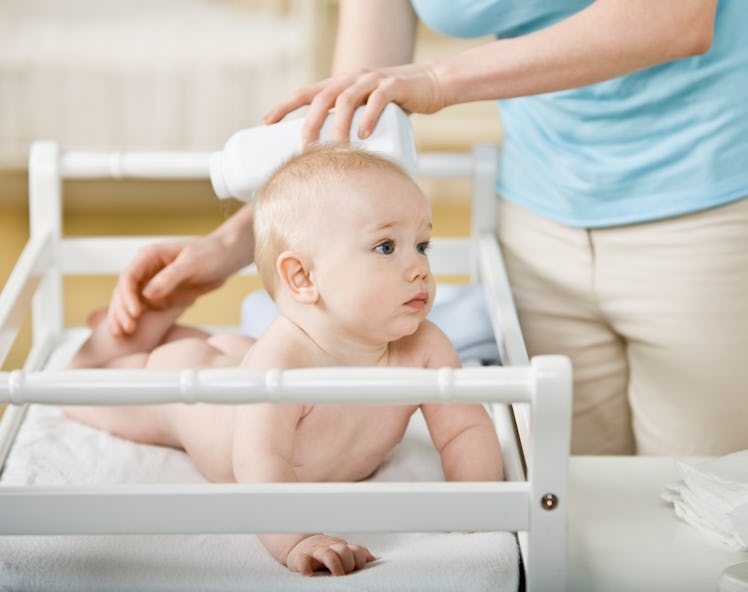Is Baby Powder Safe To Use? It Depends On What’s In It.
Despite divides in legal and scientific communities, it may be best for parents to switch to a safer alternative than talc-based baby powder.

Diaper rash got you down? Baby powder is the obvious tool to turn to. But some types of baby powder have a storied history when it comes to both scientific and legal battles. So is baby powder safe? Or is the talc found in many baby powders a Trojan horse full of potential cancer-causing chemicals? There is some concern that baby powder with talc in it could be dangerous and harmful to your newborn, and there’s a growing market for safe alternatives.
Johnson & Johnson, for example, faces approximately 38,000 lawsuits over its talcum powder products, according to Reuters. And two years after transitioning away from talc-based products in the U.S., Johnson & Johnson recently announced that it will be discontinuing its talc-based baby powder, moving to all cornstarch-based baby powder by 2023 — although the company denies that this decision has anything to do with safety concerns, and the company recently sued four doctors who published a study finding that talc products can cause mesothelioma, a deadly type of cancer of the tissues that lines organs such as the heart and lungs.
“But studies and expert opinions still fall on both sides of the argument,” says Morgan Statt, a health and safety investigator with ConsumerSafety.org.
Is Talc Safe in Baby Powder?
One of the main ingredients in baby powder is talcum powder, made from the mineral talc. Talc alone is verifiably dangerous, as research has repeatedly linked it to cancer.
Studies dating back to the 1970s have drawn tenuous links between ovarian cancer and women applying talc regularly to their genital areas. One study found 75% of ovarian cancer tumors may contain talc particles. Other research suggests using talcum powder on the genitals increases the risk of epithelial ovarian cancer by 20% to 30%. So the presence of talcum in baby powder is cause for concern, especially because so many parents use baby powder in diapers.
The American Academy of Pediatrics has been warning parents about the potential dangers of using talcum powder on infants since 1969. Talcum powder dries out mucous membranes, which can lead to respiratory diseases such as pneumonia, asthma, pulmonary talcosis (a rare lung disease), lung fibrosis, and respiratory failure.
In extreme cases, talc may be linked to lung cancer. In its natural form, talc contains asbestos. Although consumer products have been officially asbestos-free since the 1970s. And in 2021, the Food and Drug Administration sampled 50 talc-containing cosmetic products for asbestos, but it didn’t detect it in any of the products. However, courts recently awarded one man $117 million in a lawsuit against Johnson & Johnson after he claimed that asbestos in its baby powder contributed to his aggressive lung cancer. In another lawsuit, a judge awarded 22 women more than $2 billion.
All of this is based on tenuous science. The most rigorous studies have never established a compelling link between baby powder and cancer. That’s why companies can use talc in baby powder, makeup, deodorants, and even vitamins and supplements. The International Agency for Research on Cancer considers talc “non-carcinogenic” when inhaled and merely “possibly carcinogenic” when applied to the genitals. Cancer Research UK says there is no legitimate correlation between talcum powder and cancer.
At the same time, it is somewhat concerning that billions of dollars in corporate interests are tied to keeping talcum powder considered non-carcinogenic. Especially because a lawsuit revealed that Johnson & Johnson meddled with a report that the Food and Drug Administration in part relied on to decide that the company’s baby powder didn’t need a cancer safety warning, despite knowing that the product contained the carcinogen asbestos for decades, according to Bloomberg.
Do All Baby Powders Contain Talc?
“The safety of talcum powder is still being debated in both the scientific and legal communities, but that doesn’t mean you shouldn’t take caution,” Statt says.
Skeptical parents do have other options than baby powders with talc in them. Cornstarch and arrowroot powder are safe alternatives, found in a number of comparable products. So, although there isn’t clear evidence that baby powder can cause cancer, you can opt for a cornstarch or arrowroot baby powder if you prefer to play it safe.
This article was originally published on